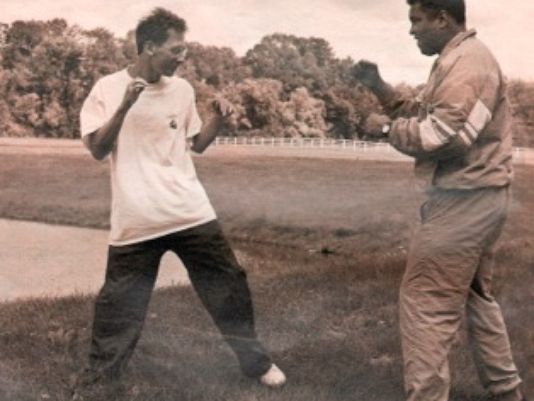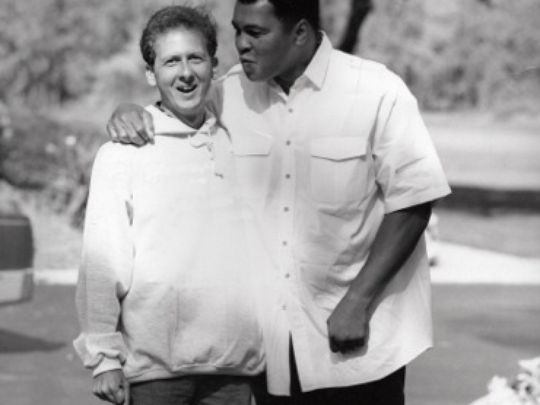Davis Miller, author of
The Tao of Bruce Lee and
The Tao of Muhammad Ali, has just released his new book,
Approaching Ali: A Reclamation in Three Acts. It’s a biography of the cultural icon, but it’s also so much more. Above all, it’s a meditation on how America crafts its heroes and how we negotiate relationships with them, real and imagined. It’s also the profoundly personal and deeply moving story of Miller himself, and of his decades-long friendship with Ali.
Miller lives in Asheville, NC, and he will be speaking about his newest work at
Malaprop’s Bookstore and Café this coming Tuesday, December 1st at 7 pm. I sat down with the author to talk about the book, his friendship with Ali, his writing process, and our connection to our cultural heroes and icons.
Ali McGhee: Can you speak a little bit about how Approaching Ali became a book? It seems its inception was "My Dinner With Ali" and then The Tao of Muhammad Ali. Where did it go from there, and what was that process like?
Davis Miller: I've been writing about Ali since 1978, when I was at university and I first began to learn to write. My first-ever published piece was a roughly 1,000 word adventure story about sparring with Ali in 1975, when I was trying to become a world champion kickboxer. That piece was published in
Sports Illustrated in 1981, and for APPROACHING ALI. I expanded it into a 6,000 word chapter titled "Mouse Meets Muhammad Ali."
What I've done with APPROACHING ALI is take my various nonfiction short stories about Ali, which were written over a forty-year period, and sharply and deeply expand and reinvent them, working toward the most elegant and truthful stories I can tell.
The book is divided into three acts, which coincide with youth, middle years, and old age: the full arc of life, Ali's and my own. It takes place over a fifty year period, from early 1964 to late 2014.
 Davis Miller and Muhammad Ali. Photo courtesy of the author.
Ali: Why did you decide to publish a second book on Ali? What's new in this book that wasn't in The Tao of Muhammad Ali?
Davis:
Davis Miller and Muhammad Ali. Photo courtesy of the author.
Ali: Why did you decide to publish a second book on Ali? What's new in this book that wasn't in The Tao of Muhammad Ali?
Davis: The focus of APPROACHING ALI is on Ali. It is the only intimately and finely detailed look at his enormously rich life after boxing and with Parkinson's disease, the years I believe to be his least observed and his greatest. The focus in TAO OF MUHAMMAD ALI was on the ways that Ali transformed and enlarged my life.
APPROACHING ALI pertains to Ali's middle years and late life as revealed through a portrait of our friendship. I hope that the book reads as an interrelated series of stories that are as evocative and truth-telling as the best short fiction. In 2013, when I first started thinking about the book, I decided to pattern it after Tim O'Brien's THE THINGS THEY CARRIED and Ernest Hemingway's A MOVEABLE FEAST. In the book, what I do with my friendship with Ali is analogous to O'Brien's Viet Nam and Hemingway's Paris.
I wrote APPROACHING ALI because it was inside me and was aching to step out into the world; to relieve the ache, I had to write it.
Ali: Can you talk about the title? How did you come up with it? It's so
interesting that it's "Approaching Ali" and that you use the word
"Reclamation" in the subtitle.
Davis: I'm happy you like the title. APPROACHING ALI has numerous meanings. In the first chapter, which is a deeply rewritten and expanded version of "
My Dinner with Ali," I physically approach Ali (and unexpectedly enter his life) at his mom's home in Louisville. While at his mom's, I begin to approach some understanding of who Ali is, as well as approach confirmation of who I'd believed him to be when he was my childhood hero as I was growing up in western North Carolina. In "My Dinner with Ali," I also begin to approach the direction that the next thirty years of my life will take; I begin to approach becoming a writer.
In every story, every page, every paragraph, every sentence in the book, I'm approaching Ali, becoming closer to him as a mentor and friend, and gaining understanding of him both as a very mortal yet extraordinary person and as an American and international mythological figure. And, in each fresh encounter with Ali, I become a better, more consummate writer.
The reason the word RECLAMATION is included in the subtitle is because so many of us regard the Parkinsonian Ali as being so much less than the person he was before Parkinson's. I've heard very many people, including writers, refer to Ali as if he is broken, even brain dead, and in a vegetative state. The Ali I have known and spent a serious amount of time with is anything but. Indeed, in many respects, he has been made wise by his Parkinson's. My editor, Phil Marino, correctly felt that the book needed a subtitle. Over several telephone conversations, Phil and I came up with A RECLAMATION IN THREE ACTS.
Not coincidentally,
Approaching Ali is the title of a
one-act chamber opera that's based on my transformed-by-Ali stories. The opera was the first commission by the Washington National Opera for its American Opera Initiative.
Approaching Ali was composed by
D. J. Sparr, and I co-wrote the libretto with Pulitzer Prize-winning librettist
Mark Campbell. The opera received its world premiere in 2013 in two sold-out, standing-ovation performances at the Kennedy Center. The North Carolina Opera produced performances in Raleigh and Durham this past January and February. Within the next couple of seasons, I hope that the
Asheville Lyric Opera will produce performances for my hometown.
 Davis Miller and Muhammad Ali. Photo courtesy of the author.
Ali: What were the biggest challenges of writing and publishing this book? What were the biggest rewards?
Davis:
Davis Miller and Muhammad Ali. Photo courtesy of the author.
Ali: What were the biggest challenges of writing and publishing this book? What were the biggest rewards?
Davis: When my editor made an offer in late October 2014, he told me that he saw APPROACHING ALI as a big gift book for Christmas 2015, which meant that I needed to deliver a finished manuscript by mid December 2014. I would usually want/need/get two years to write a 60,000 word book. This time, I had to deliver world-class writing in less than two months. I did it. And I made it happen while taking care of my two year-old son full-time every day: chasing him around the house while he was squealing and yelling, trying to keep him from hurting himself; changing diapers; feeding him meals and snacks; giving baths. No day care. I wrote over 30,000 words in fewer than sixty days. And those 30,000 may well be the best work I've ever done.
The largest reward is that my publisher is taking this book and me seriously. W. W. Norton is the best U.S. publisher I've worked with; there is no more serious or better publisher. Everyone at Norton is behind my writing and this book. I've never before had that happen. TAO OF MUHAMMAD ALI and TAO OF BRUCE LEE have both been top-five bestsellers in the U.K., where it's well understood that I'm a serious literary writer and where I've often been called the Yank Nick Hornby. For the first time, with the fine work the people at Norton are doing, it looks like I may get some recognition in my own country.
Ali: You've written about some major cultural and sports icons (Ali and Bruce Lee). Why are you drawn to these figures, and what wisdom do you think they can impart to all of us?
Davis: Ali and Bruce Lee were my childhood heroes who pulled me from paralyzing sorrow after my mother's unexpected death. Ali was everything I wasn't growing up as a short, scrawny, morose,depressed, shut-down, and internalized white kid in western North Carolina. He was king of the world, and I lived vicariously through him. I knew, however, that I could never be Ali: he was so singular, such a mutant. And he was so damned huge. Bruce Lee was my size, almost identically so, and he, like Ali, was a world-beater, a world soul.
Wisdom. Ali has always had a particular wisdom that resides inside him, so deep and organic that it seems to be part of his DNA. And his Parkinson's has allowed him to become a whispering muse, some sort of wise grandfather figure for the world. Bruce Lee was not a wise person, though he has been depicted as one in (godawful) movies and books. He was bright, but not nearly so clever and capable as he believed himself to be.
Ali and Lee's stories both teach us much about the 20th and 21st century American mythology of self-actualization, which is among our country's chief exports to the world. This is what I've written about in my first three books.
Davis Miller will be sharing more at his talk on Tuesday. It's free and open to the public, and you can buy a book and have it signed, just in time for the holidays.